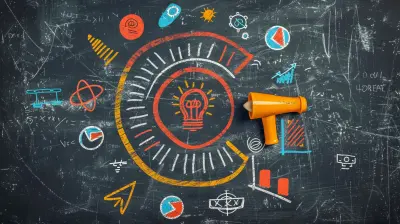Redefining Success: What Every Salesperson Should Measure
19 June 2025
When we think about sales, one word tends to dominate the conversation—revenue. Close those deals. Hit the quota. Drive the bottom line. It’s the traditional scoreboard every salesperson has been taught to play by.
But here's a question worth asking: _What if we're measuring success the wrong way?_
Sales isn't just about numbers anymore. The game has changed, and the best players aren't only chasing monthly targets—they’re refining their approach, building real relationships, and focusing on long-term wins.
Let’s dig a little deeper into what success in sales really looks like today, and what you should actually be paying attention to if you want to thrive in this new landscape.
Why It’s Time to Rethink Success in Sales
Let’s get real: the traditional sales funnel is kinda outdated.Buyers are smarter. Markets are saturated. Automation is everywhere. The “hard sell” just doesn’t work like it used to. Customers now expect value, connection, and transparency before they'll even _think_ about pulling the trigger.
So if you're only measuring success by the size of your paycheck at the end of the month, you're missing the bigger picture.
Success in sales should be like a balanced diet. Imagine trying to live on just protein shakes—sure, you’ll build muscle, but eventually, your body’s gonna crash. Likewise, if your sales success is measured solely by revenue, you’ll hit burnout before you hit your true potential.
The New Age of Sales Metrics
Let’s redefine what success means. Below are some modern metrics that are just as important—sometimes even more important—than your monthly revenue.1. Customer Lifetime Value (CLTV)
This one’s huge.Why? Because it tells you how much a customer is _really_ worth over time. Selling once is nice. Selling multiple times over years? That’s gold.
If you're nurturing relationships, offering consistent value, and staying top of mind, you’ll build a long-term pipeline that keeps paying dividends. Always ask: _Am I building customers for life, or just one-night stands?_
2. Conversion Rate, Not Just Sales Volume
Sure, you had 100 calls this week. But how many actually converted?Your conversion rate is like your batting average—it shows your efficiency. If you're focusing on numbers alone (calls made, emails sent), you’re measuring activity, not impact. And we both know those aren't the same.
High output looks good on paper. But quality conversions? That’s where the money is.
3. Sales Cycle Length
Ever had a prospect ghost you for months before finally buying? Yeah, we’ve all been there.Tracking how long it takes from first contact to close gives you insights into your process—and where it's leaking time or energy.
Shortening the cycle doesn’t mean rushing a customer. It means streamlining your approach so each interaction moves the needle without unnecessary lag.
4. Customer Satisfaction and Retention
Happy customers come back. Unhappy ones leave—and take their friends with them.Retention is one of the most underrated metrics in sales. It tells you how well you set expectations, delivered value, and built trust.
Are your customers renewing? Referring others? Giving positive reviews? If not, no amount of new leads will save you in the long run.
5. Sales Qualified Leads (SQLs)
It’s not about how many leads you get, it’s about how many are _actually worth your time_.SQLs are leads that are not just interested—they're ready to buy. When you focus on quality over quantity, you’ll find yourself closing more deals with less effort.
Work smarter, not harder.
Soft Skills: The Secret Sauce of Sales Success
Okay, let’s get into the intangible stuff—the things that don’t show up on Salesforce dashboards but make all the difference.1. Emotional Intelligence (EQ)
You can have the best pitch in the world, but if you can’t read the room? You're toast.EQ in sales means understanding what your buyer is feeling, what they’re worried about, and how they like to communicate. It’s empathy on steroids.
High-EQ sales reps connect deeper and close better. Simple as that.
2. Listening Skills
Stop selling. Start listening.Often, we think good salespeople are great talkers. Not true. The best ones are great listeners. When you listen with intent, you pick up pain points, cues, and objections before they’re even spoken out loud.
It’s like catching a pitch before it's even thrown—you’re always one step ahead.
3. Adaptability
The market shifts. Buyers change. Products evolve.Are you adjusting your approach, or just repeating the same script over and over? Success today means being flexible. That might mean experimenting with new tools, trying out different sales techniques, or taking feedback constructively.
If you're stuck in your ways, you're setting yourself up to lose.
Activity vs. Impact: Where Are You Spending Your Energy?
Let’s have a heart-to-heart.Too many salespeople wear "being busy" like a badge of honor. Calls, emails, pitches, demos—it all looks like hard work. But is it _working hard_ or is it just _hardly working_?
Here’s a better metric: Impact per effort.
Track what’s actually moving the needle. If 80% of your sales are coming from 20% of your activities, it’s time to realign. Focus on high-impact actions, not just high-volume actions.
Personal Growth as a Success Metric
Maybe this one’s a curveball, but it matters—how are YOU growing?1. Skill Development
Are you learning new tools? Adopting fresh strategies? Staying current with industry trends?Great salespeople never stop learning. They’re always evolving, always getting sharper.
2. Resilience and Mindset
Sales is tough. You ride emotional rollercoasters daily. So, what keeps you grounded?Tracking your mental state, confidence levels, and ability to bounce back after rejection isn’t just good for your health—it’s vital for your success.
If you can handle the lows with grace and the highs with humility, you're already ahead of the pack.
The Role of Technology in Measuring Success
Let’s be honest—tech is your best friend.From CRMs to AI-driven analytics, modern tools can help you track metrics you didn’t even know existed.
- Use dashboards to monitor KPIs in real-time.
- Automate reports to keep tabs on your pipeline health.
- Leverage AI to gain insights on customer intent, behavior, and engagement.
But remember, tools are only as good as the person using them. Don’t get lost in the data. Focus on what’s actionable.
Quality Over Quantity: The New Sales Creed
You might’ve heard, “It’s a numbers game.” To an extent, sure.But here’s a twist: It’s a quality numbers game now.
Would you rather have 50 lukewarm leads or 10 red-hot ones? Exactly.
Modern sales success looks more like a sniper than a machine gun. Precision, timing, and intent matter more than ever.
Tracking Alignment with Company Goals
Here’s a golden nugget: The more aligned you are with your company’s goals, the more impactful your sales will be.Understand the bigger mission. If your company is shifting toward customer success or recurring revenue models, selling the quick-win, one-time deal may not actually _serve_ the business anymore.
Smart salespeople sell _within_ the game plan, not outside of it.
Final Thoughts: Redefining What Winning Means
Success shouldn’t be a single number at the end of the month. It should be a reflection of how well you've engaged, helped, and grown—both as a professional and as a person.So, let’s move beyond the scoreboard and start asking:
- Did I build lasting relationships?
- Did I provide real value?
- Did I make the buying process easier for my customer?
- Did I grow today?
Because when you focus on these things, the revenue takes care of itself.
Success in sales isn’t just about what you close—it’s about what you open.
Actionable Takeaways
Here’s a quick-hit checklist you can start using today:✅ Track Customer Lifetime Value (CLTV)
✅ Prioritize high-converting activities
✅ Monitor your sales cycle length
✅ Focus on customer retention
✅ Improve emotional intelligence and listening skills
✅ Leverage tech tools wisely
✅ Align sales with company mission and values
✅ Celebrate progress, not just paychecks
Make this your new scoreboard.
all images in this post were generated using AI tools
Category:
Sales StrategiesAuthor:

Caden Robinson
Discussion
rate this article
2 comments
Eva Gates
Success isn't just about numbers—it's about impact! If you're measuring sales without considering relationships, you're just counting beans. Time to elevate your game, sales pros!
November 8, 2025 at 5:00 AM

Caden Robinson
Absolutely! Success in sales goes beyond numbers; it's about fostering meaningful relationships and creating lasting impact. Let's shift the focus to what truly matters!
Greta Mendez
In the dance of sales, success takes new form, Beyond mere numbers, let heart and values transform. Measure not just the closings, but the bonds that you make, For true success blooms where authentic connections awake.
June 20, 2025 at 4:50 AM

Caden Robinson
Thank you for capturing the essence of redefining success in sales! It's about building genuine relationships that drive lasting impact.


